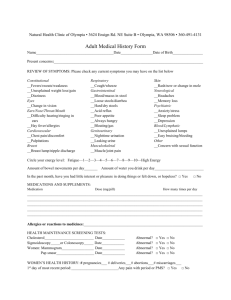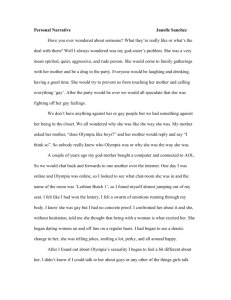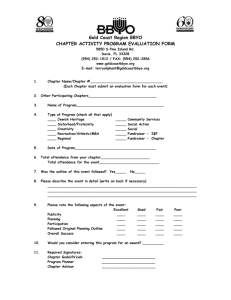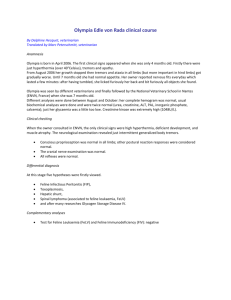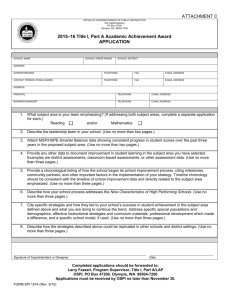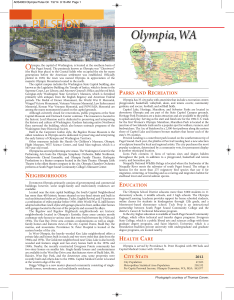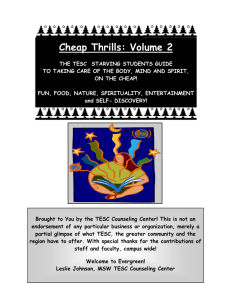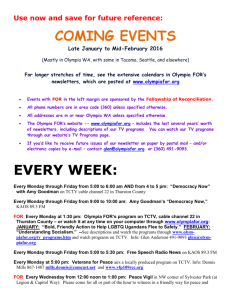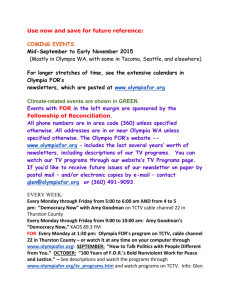7-Transformative Experiences-UW COM
advertisement
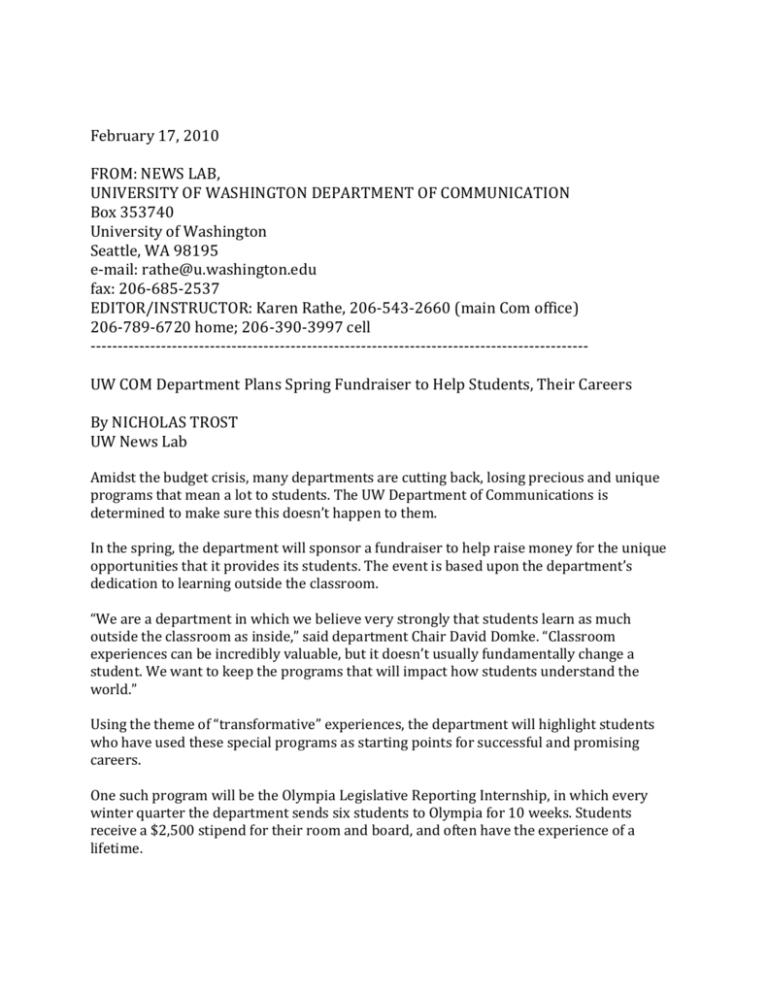
February 17, 2010 FROM: NEWS LAB, UNIVERSITY OF WASHINGTON DEPARTMENT OF COMMUNICATION Box 353740 University of Washington Seattle, WA 98195 e-mail: rathe@u.washington.edu fax: 206-685-2537 EDITOR/INSTRUCTOR: Karen Rathe, 206-543-2660 (main Com office) 206-789-6720 home; 206-390-3997 cell -------------------------------------------------------------------------------------------UW COM Department Plans Spring Fundraiser to Help Students, Their Careers By NICHOLAS TROST UW News Lab Amidst the budget crisis, many departments are cutting back, losing precious and unique programs that mean a lot to students. The UW Department of Communications is determined to make sure this doesn’t happen to them. In the spring, the department will sponsor a fundraiser to help raise money for the unique opportunities that it provides its students. The event is based upon the department’s dedication to learning outside the classroom. “We are a department in which we believe very strongly that students learn as much outside the classroom as inside,” said department Chair David Domke. “Classroom experiences can be incredibly valuable, but it doesn’t usually fundamentally change a student. We want to keep the programs that will impact how students understand the world.” Using the theme of “transformative” experiences, the department will highlight students who have used these special programs as starting points for successful and promising careers. One such program will be the Olympia Legislative Reporting Internship, in which every winter quarter the department sends six students to Olympia for 10 weeks. Students receive a $2,500 stipend for their room and board, and often have the experience of a lifetime. The program has had a tremendous amount of success. Heather Brooke, an alumni of the Olympia Program, just made international headlines with her investigative work in Britain, where she set the stage for the resignation of the speaker of the House of Commons. She cites the Olympia program as the experience that started her career. “It all came together with that internship,” said Brooke. “The internship opened a lot of doors for me.” In addition to the Olympia internship, the department gives 5 students every summer the chance travel to China, Sierra Leone, Cambodia, Kenya and South America, to work for English-speaking news organizations. For some students, this is why the came to the UW. “I came to the Journalism program at the UW because of the Foreign Intrigue program,” said Chantal Anderson, a Foreign Intrigue scholarship winner. “It was really important to me that I was able to do it, and I had such an incredible experience.” In addition to the Olympia and Foreign Intrigue programs, the department offers study abroad programs in Rome, Switzerland and Argentina. Here students work closely with their faculty mentor, gathering evidence and learning the fundamentals of research. For many students, these programs create valuable mentorships. “I met Crispin Thurlow when I went with him to Switzerland,” said Kristy Hogue, a participant in the department’s Switzerland study abroad and Honors programs. “It was great to form a relationship with a professor like that and it really got me excited to do research. He later became my advisor for my senior year Honors coursework.” The UW Department of Communication has prided itself on providing their students with the opportunities to go abroad and experience their course of study first-hand. But you don’t always have to travel far to have a transformative experience. One class transforms hundreds of students each year: COM 220 Public Speaking. “I love teaching this class, it is so intoxicating,” said Matt McGarrity, professor of COM 220. “It can be such a thrill. There are always great success stories. It happens every single quarter.” COM 220 is a unique class that gives its students the chance to perform an advocacy speech in Red Square. Often students are nervous in the beginning of the class, but come out confident and eager to speak in public. “Everyone has a huge gasp when I tell them they have to speak in red square,” said McGarrity. “But we scale up to that point, and there is often huge improvement. In fact, it usually happens right before my eyes. Now that’s transformative.” McGarrity cites the Public Speaking Center as one of the key components to the success of the class. And like all of the opportunities described here: They need money. “The lectures are great, but none of that matters if the students don’t have the opportunity to get their hands on the speech like they can in the speaking center,” said McGarrity. “Almost every department on campus has had to cut their writing centers because of budget cuts. We can’t afford to do that.” It is clear that no one wants to see these programs go away. Not the professors, and certainly not the students. Some students depend on department funding to follow their goals and chase their dreams. “For me, department funding has been really important because I am paying for school myself,” said Anderson. “Paid internships are almost impossible to find in WA State right now and this is one of the few opportunities that you can gain professional experience and get paid. It is definitely very important and I am very lucky that the Department of Communication funds this program.” Kristy Hogue echoed these sentiments, saying it would be hard to swallow if the department had to shut down the programs that have given her so much success and motivation. It would be a real shame if the department had to cut program such as Honors,” said Hogue. “There were 10 really motivated people in that class who were itching to get their hands into research before graduate school, or before they graduated to get that experience. The funding is so important.” These are precisely the reasons why the Department of Communications has gone out of its comfort zone, and planned a spring fundraiser so it can further provide for its motivated students. “It is not what we do for the most part here, is go out and raise money,” said Domke. “But we believe so strongly in these experiences for our students and these pieces that shape who they are, so we’ve decided to take this leap. It’s all about the students.” Whatever the outcome, it is clear that the Department of Communication cares about its students. The extraordinary opportunities they provide and the idea of the spring fundraiser are byproducts of the department’s goals and aspirations. And the students appreciate it. “The department has made such a difference in my life,” said Anderson. “I could go on and on with what the program has done for me. I have had the coolest professors, great opportunities and so much support. This department is awesome.” (NICHOLAS TROST is a student in the University of Washington Department of Communication News Laboratory.) Nick, your timing is perfect! The next e-newsletter goes out in March and I am using the platform to promote a new, and very important, event happening in April. The event is a fundraiser for student experiences that transform their academic career. Some examples you may be able to relate to are the Olympia Legislative Reporting and Journalism Foreign Intrigue internships. These transformative experiences also include study abroad, any graduate student research that involves work beyond the usual program of study and faculty efforts that transform the classroom experience. Our alumni board suggested this event to us about a year ago and we debut their vision on April 15. The story would cover many areas: -event details -transformative experience descriptions -interviews with students and faculty -interviews with our Alumni Board members -interviews with alumni
